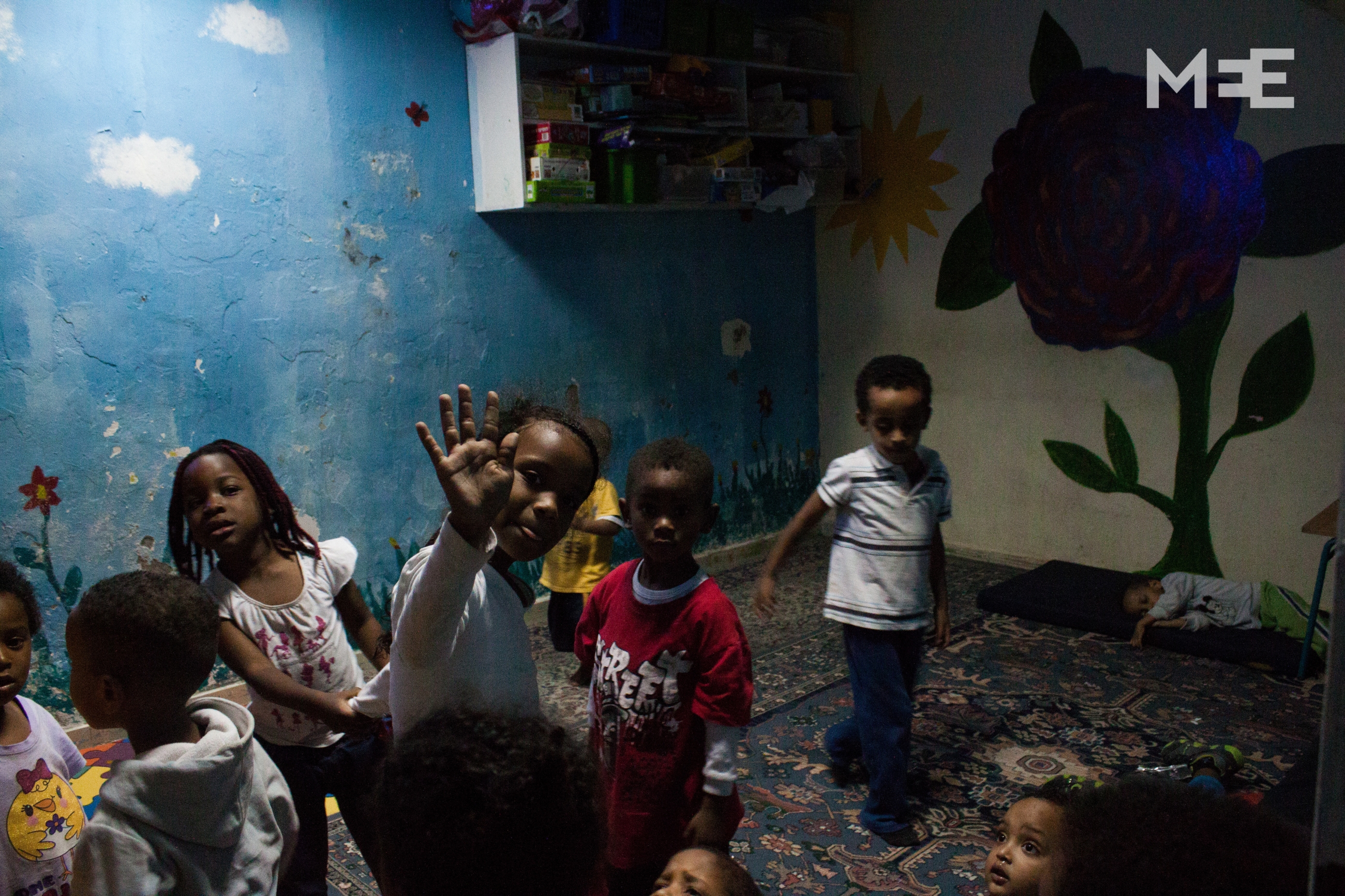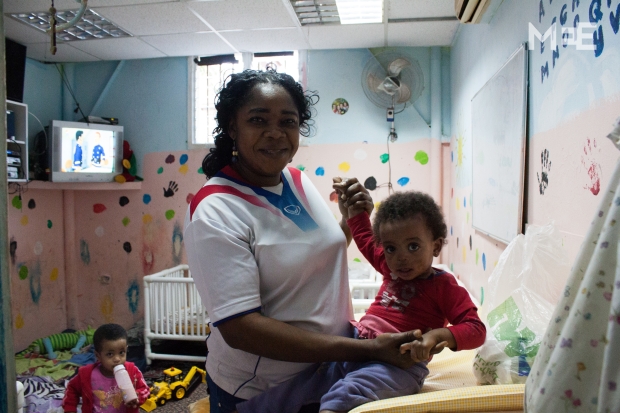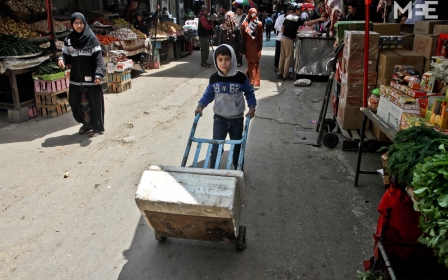Death trap nurseries: The tragic underbelly of Israel’s migrant city

One baby died as a result of being tangled in a plastic bag and suffocating. Another due to lack of food. A third died from meningitis. Typically a bottle is left in the crib or is even tied to the mouth by overworked babysitters, often looking after 15 or 20 infants each. It was here in these “children’s garages” – the so-called Gans cannot be described as kindergartens – that five young children died in a six-week period. The five children, aged between four and eight months, were all from refugee families. Through lack of a better alternative, they were being looked after in crowded and under-staffed nurseries.
A spotlight has now fallen on the “Gans” where the children of migrant workers living in South Tel Aviv are left in an unregulated childcare system serving the poorest people in the city.
“I have been doing this job for 21 years,” says Felicia, a babysitter from Ghana. “I am the first Gan (nurse or “babysitter”) to open in Tel Aviv.” Felicia takes care of 45 children between newborn and three years old during the day, 80 after school, with four workers.
She agreed to talk to Middle East Eye in a heartbeat - whereas most of the babysitters now keep their doors closed to journalists after negative reports were published, and after calls to close the Gans were made by some residents and officials.
Her Gan is located in South Tel Aviv, the “black city” as it is often called, for it is home of an important Jewish Mizrahim and Ethiopian population, and of thousands of migrant workers, refugees and asylum seekers, legal or illegal, mostly from South Asia and Africa.
There is no sign to tell that it is a nursery from outside, only a colourfully painted wall and the sound of children playing coming from the windows. Around 6pm, the parents come to pick up their children, mothers for the most part, Eritrean, Sudanese, or from West African countries. In the nursery, the language is English with the small ones, Hebrew with the ones already in school.
Alone with 70 infants
If some reports have put the blame on the babysitters or the parents for the death of the last five infants, for Felicia, it was an accident. “I always say, when these things happen, that there is no babysitter waking up in the morning, opening the door of her Gan, and thinking that something bad will happen,” she explains, seated on a table in the entrance of her Gan while her seven-year-old daughter plays around her. “Nobody is above accidents or mistakes. The babysitters need knowledge, the people coming in to work in the Gan need to be trained.”
At first, Felicia was alone with 70 children. Mesila, a municipality-run organisation, trained her, 10 years after she opened her Gan. Mesila is still open today, but its director refused to be interviewed for this article. “When [they] saw me and brought me to a seminar and first aid course, it opened my mind, it made the job easier for me. They sent one trainer here, asked me to take on other workers.”
Her Gan is still overcrowded. About 40 square metres, one small kitchen with a removable hotplate, one sink, two small rooms, one packed with cribs for the smaller children, another with carpets for the bigger ones. Each room has its TV. The walls are painted colourfully. The corridor is packed with bags of donations, clothes, toys, food and with a rack for the children’s clothes and bags. Poorly lit, the place doesn’t offer any outdoor space. “If I had a hand to help me, I know it would be better than this, and the children would be free. Because you see, we have the house with no place for the children to play. But I don’t have the money. I cannot do the job by myself,” explains Felicia.
She says her monthly rent is 10,000 shekels ($2,554) and she pays her workers 4,000 shekels a month ($1,021). The parents are supposed to pay 600 shekels ($153) a month for full-time care and 300 ($76) for after-school babysitting.
“It is not easy. Sometimes I have debts,” says Felicia. “If it was a business, in 21 years, I would have had money. But I’m doing it on humanitarian grounds. I don’t want the children to be in the streets. If they can’t pay and you don’t take the child, he will be in the house alone. They’ll close the door and the mother will go to work.” For that reason, most of the parents can only pay her 400 shekels ($102) instead of the 600 she asks for, and she will also take some children for free when necessary.
'It’s a matter of free market'
Most of the local NGOs and babysitters agree that the babysitters should be trained under the government’s monitoring. Yet in this over-populated and widely mixed neighbourhood, the death of these infants is a symptom of the overall situation that migrant workers and asylum seekers are forced to live in.
For Maya Peleg, from UNITAF, a day care and refugee service centre funded by Mesila and now independent, “It’s a matter of the free market. From zero to three years old, there is no kindergarten. Each one goes to a private kindergarten. I pay 3000 shekels ($766) a month for my kids. It’s very expensive. Refugee, asylum seekers, migrant workers cannot pay this, so they opened their own place. [The babysitter] wants to earn money. So she doesn’t want to take on workers and will take on as much kids as possible, while the parents want to pay less.”
“It’s a children garage. It’s not really a kindergarten,” she continues. “If you go there, most of the time you will see small rooms, packed with cribs. The kids stay from early morning to nine in the evening, all day, inside the cribs (…). Because they have 15 babies [per worker] and they are busy with making food or cleaning; when they have time, they feed them with a bottle, other times they just tie the bottle to the mouth.” One of the five infants died due to this last system. Another tangled himself in a plastic bag and suffocated. A third died of meningitis.
Maya trains and monitors the babysitters to transform their nurseries into proper kindergartens. Her programme shows good results: 200 children in new nurseries, 450 on a waiting list, babysitters and new workers trained. The asking price has been raised to 800 shekels a month, even though some children are being subsidised when their parents cannot cover the full amount.
For Rotem Ilan, from the Association for Civil Rights in Israel, this is a question of priorities: “The parents used to pay more, and now less and less with, as a result, too many children per worker. We have 70 babysitters. Some are terrible and need to be closed today (…). It’s the responsibility of the government but the kindergarten teachers and parents also have a responsibility. They too are to be held liable and uphold certain standards.”
UNITAF’s system is now considered a model of its kind. Until now, the organisation was founded partly by the municipality, which also gives the space for the kindergarten, and partly on private donations. Fifty-six million shekels ($14.2 million) over four years are supposed to be allocated by the government in order to build new day care centres on UNITAF’s model.
Yet four years might not be fast enough. The nurseries where the most recent deaths occurred are supposed to be closed but, according to Felicia, they have actually re-opened somewhere else, with the same babysitters but possibly worse conditions - but now hidden from view. “All the women go back to the Gan, even to the place where these things happened. Because they know it’s an accident. They and their children love the babysitter,” says Felicia. They also have no other choice.
A deadly symptom of South Tel Aviv
The local community is therefore trying to take things into their own hands and act to speed the process up. Two weeks ago, Shula Keshet, a Mizrahim feminist and head of Ahoti – a local feminist organization – together with Ilan gathered a group of local residents to organise a demonstration on the issue. Representatives of the Eritrean, Congolese and Philippine community, as well as “veteran” residents of the area (Mizrahim) and social workers were present.
This meeting was part of the “Power to the community” initiative started in 2013 which aims to bring together all the residents of the neighbourhood in a joint effort. The initiative aims to reduce the tensions between the communities and put pressure on the authorities to support the development of South Tel Aviv in coordination with its inhabitants.
For Shula, the death of these children “is the result of ghetto condition (…). There is a wall, the Rothschild [boulevard] wall.” According to her, this street separates the “black city”, from the “white City” in the north, inhabited by a richer and mostly Ashkenazi class.
“They will not allow anyone of us to live [in the north]. The goal is to make us leave (…). These conditions have to stop, these racist policies have to be stopped. If we are not fighting against this, we are losing our humanity,” exhorts Shula.
Crisis of state neglect
For Ilan, kindergarten provision is in crisis across the country, as the Israeli state doesn’t provide families with public kindergartens - but the marginalisation of the asylum seeking and migrant population is the real reason behind the death of the children. It is not merely a problem of available space. “It is hard to find work for illegal migrants, it’s easy to take advantage of them. Without a proper work permit, they still can work but it’s harder to find, and they are treated as livestock,” she explains.
The group present at the gathering that day elaborated a ten-point petition asking the state to declare South Tel-Aviv a priority zone and to solve the situation of the parents, in order to avoid any more infant deaths.
The families of the dead infants were indeed almost all Eritrean, a population that is being widely refused asylum status in Israel. According to Anat Ovadia, spokeswoman for the Hotline for Migrant workers, in total, only four Eritrean asylum seekers have been recognised as refugees while about 75 percent of them are generally granted refugee status in other countries.
In their petition, the community activists demanded an review of the asylum seekers’ request to regularise their status and ensure protection, as well as a stop to the deportation and detention of men and migrant leaders, leaving women alone. According to Anat, married men cannot legally be deported, but according to Felicia and the Power to the Community gathering, women seem to be left alone increasingly, and deportation of their companions is the main reason.
Last Sunday, 300 people - migrants, asylum seekers, veteran residents and social activists - all came out behind the demands elaborated the week before. For Ilan, this is the proof of the joint struggle that the death of the migrant infants represents for South Tel-Aviv: the struggle of all the mothers and residents of the neighbourhood against deadly policies of exclusion.
New MEE newsletter: Jerusalem Dispatch
Sign up to get the latest insights and analysis on Israel-Palestine, alongside Turkey Unpacked and other MEE newsletters
Middle East Eye delivers independent and unrivalled coverage and analysis of the Middle East, North Africa and beyond. To learn more about republishing this content and the associated fees, please fill out this form. More about MEE can be found here.





